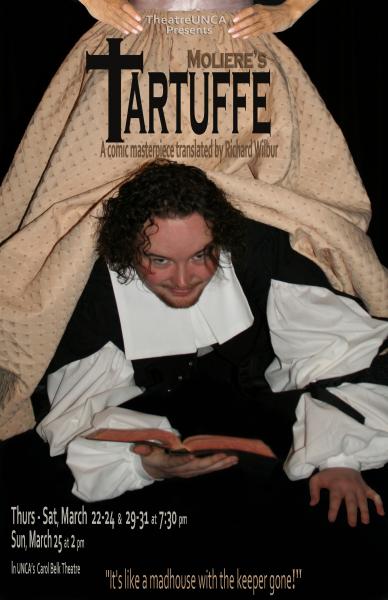For all the buffoonery inherent in a play like Tartuffe, it may be easy to forget Moliere is no joke. His plays were so rich with literary theatrics, it might seem like a small task to simply climb into the pants of his characters and recite the script. Alas, one must go all out, withhold nothing, pull no punches, figuratively rev the figurative engine to full-figurative-throttle.
An underperformed Moliere play would be tragic, indeed.
Onstage now at UNCA’s Carol Belk Theater, the all-student production of Tartuffe, or The Imposter, packs in everything a good play must: sex, betrayal, religion, humility, delusion, and demise.
As the naively optimistic Orgon, Jeffrey Williams delivers a splendid performance, aptly portraying a character who believes his buddy Tartuffe to be both loyal and misunderstood. The latter’s supposed gold heart and humility are, to Orgon, eclipsed only by his steadfast faith. So adamant is Orgon’s devotion to his friend, he tells his brother at one point he would be happy to forsake his children, his wife, and his own brother for Tartuffe’s honor. Big talk, to be sure, but Orgon winds up living up to his word only to discover Tartuffe’s unhinged and unconscionable pursuit of the former’s wife. Hilarity and disillusionment ensue.
Of course, the economy being as it is, the temptation is to plunge one’s tongue deeply into one’s cheek as one laughs at the foreclosure of property by a lying scoundrel such as Tartuffe. Indeed, the antagonist manages to swindle a kindly and affectionate fellow out of his house by show-horsing his religious piety and lying about some unerring dedication to justice. Perhaps that theme hits a little close to home (pun intended) for many folks these days, screwing the point ever further until the whole plot becomes flat-out screwball.
At any rate, the set is beautifully designed by Rob Berls, the costumes are hilariously appropriate (designed by one Carol Blanchard), and the show itself is mostly well-cast. Will Store’s Tartuffe is prone to mumbling here and there, making his soliloquies a bit difficult to bear sometimes. But he carries the scoundrel quite well, pulling him darn near to downright creepy. Overall, the company is terrifically well-cast, and they have three more performances running through this weekend.
Visit UNCA’s theater website (http://drama.unca.edu/theatre-unca) for tickets, showtimes and further information.





Ms. Ruehl seems to be using the “if you can’t say anything good about a production, don’t say anything” rule of theater reviewing for this essay. She tells us about Moliere and the plot and themes of the play, but she doesn’t say much about what took place in this particular production. She does mention that the set is “beautifully designed” and the costumes are “hilariously appropriate” and that the actor playing Tartuffe “is prone to mumbling.” Twice in the same paragraph she says the production is “mostly well-cast” and “terrifically well-cast.” But what does “well-cast” mean to potential theater-goers trying to decide how to spend their evening and their entertainment dollars? Are we meant to read something into this cryptic, one-sentence paragraph? “An underperformed Moliere play would be tragic, indeed.” Come on, Mountain Xpress, you can do better.
You misspelled the name of the man playing Tartuffe. It is Will STORRS, not Will Store. A cursory review of the program might have given you that information.
easy there killer, no reason to start a rumble.